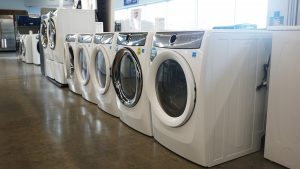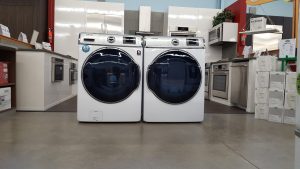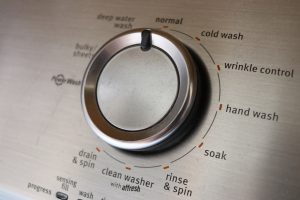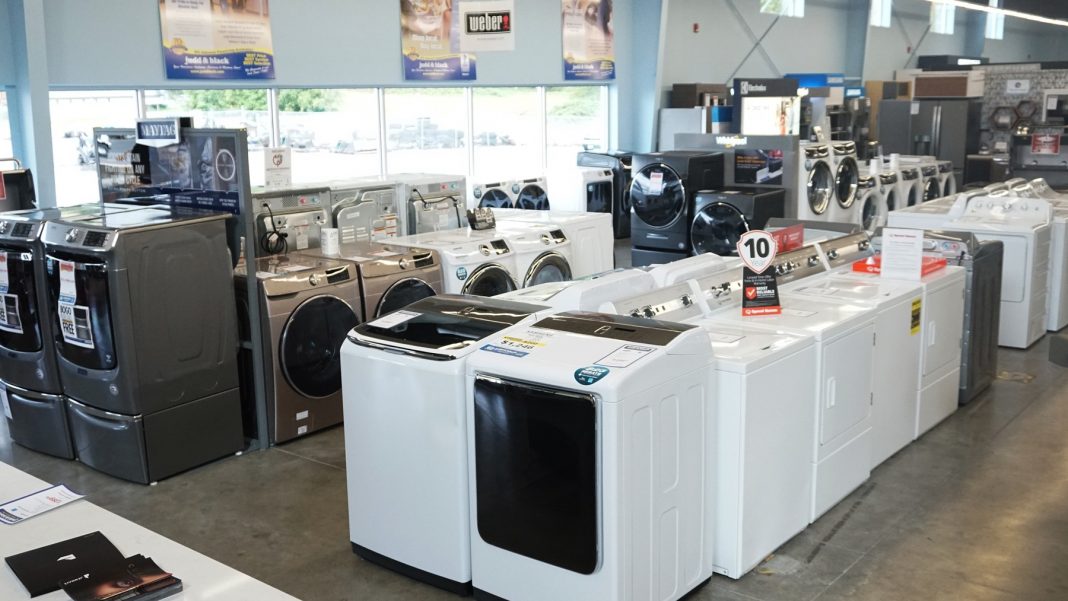A washer and dryer is a critical part of any home appliance set-up. It’s easy to get sucked into the void of internet searching when trying to decide what type of washer and dryer you should buy: will it last a long time? Will it save me money? Will it get my kid’s football jersey clean? Will I over pay? Finding the right machines for your specific needs doesn’t have to be difficult, though. The knowledgeable staff at the locally-owned Judd & Black Appliance in Mount Vernon are here to help you find the right set for your family.

Top load or Front load?
Dave Evans, sales associate at Judd & Black Appliance, says deciding on a top load or front load laundry set-up mostly comes down to a matter of personal taste. Some people stack their washer and dryer, while other prefer them side-by-side. Typically, front load washers use slightly less water. They also have a higher spin rate than some top loaders, extracting more water from fabrics and thus shortening drying times. The energy efficiency of top loaders, he says, has become more in-line with the efficiency of front loaders over the years, with manufacturers designing machines that use less water than ever before.
“Sometimes people think these machines wouldn’t wash as well with less water, but with the agitator designs, and the detergents with higher enzymes, fabrics still come out nice and clean,” he says.
Gas or Electric?

Whether to purchase a dryer that uses gas or electric energy is another point of debate. Evans says that choice tends to depend on energy costs where you live.
“Washington tends to lean heavily towards electric drying, because of our hydroelectric power,” he says. “Kilowatt costs are less than say, in California, where 80 to 90 percent of dryers tend to be gas.”
Both set-ups have similar performance, Evans says, although gas dryers preheat slightly faster than electric ones.
Utilize Your Space
Whatever set-up you choose, Evans says it’s important you find a laundry set that will be a proper fit where you put it, providing laundry quarters that aren’t too cramped. Can you set down your laundry baskets and still be comfortable while loading and unloading your laundry?
If space is a concern, Evans says, Judd & Black Appliance has more compact laundry sets to accommodate. Regardless of what you choose, Judd & Black Appliance works with customers to determine what’s best for them, asking pertinent questions about where appliances will go, and how many people in the family will be using them.
“We don’t try to push anything on people; we want to make sure that they get the proper appliance for their needs,” he says. “We like to make sure everything works out nice and smoothly.”
Efficiency and Longevity

Every few years, increases in government regulation cause washer and dryer manufacturers to step up their game on building energy-efficient appliances. If your home has an older washer or dryer, it may use up to three times more water or electricity than a newer, more energy-efficient model, Evans says.
“That 25 year-old unit that you have chugging along, if it failed and you replaced it, you’d probably notice some differences in your monthly utility bills,” he says.
The average lifespan of a washer or dryer is about 6 to 12 years, Evans says. The more advanced your machine is, the more likely an electronic sensor failure is what will necessitate service maintenance, as opposed to a mechanical issue.
If your current washer or dyer is having issues and you aren’t quite ready for a new set, Judd & Black’s service technicians are happy to visit your home and figure out a fix, regardless of where you purchased them. The company services most major brands and setting up an appointment is just a phone call or e-mail away.
With all this in mind, consider visiting Judd & Black Appliance the next time you need to upgrade your washer and dryer. With nearly 80 years of friendly, local service, they’ll be happy to make sure you get the right machines to make your next laundry day the best it can be.
Sponsored




































